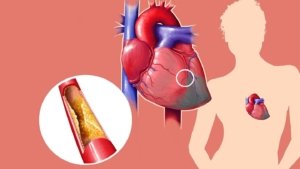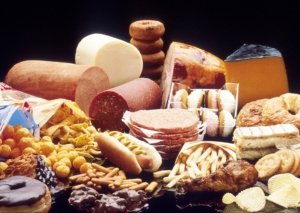Understanding Cholesterol, Risk Factors And Best Practices To Fight Complications Understanding Cholesterol, Risk Factors And Best Practices To Fight Complications The Most Effective Ways to Keep Your Body Healthy with Proper Detoxification | Naturactin Health and Wellness
Naturactin Health and Wellness
1- What is cholesterol?

Cholesterol is a waxy substance found in your blood. Your body needs cholesterol to build healthy cells, but high levels of cholesterol can increase your risk of heart disease.
With high cholesterol, you can develop fatty deposits in your blood vessels. Eventually, these deposits grow, making it difficult for enough blood to flow through your arteries. Sometimes, those deposits can break suddenly and form a clot that causes a heart attack or stroke.
High cholesterol can be inherited, but it’s often the result of unhealthy lifestyle choices, which make it preventable and treatable. A healthy diet, regular exercise, and sometimes medication can help reduce high cholesterol.
2- Symptoms
High cholesterol has no symptoms. A blood test is the only way to detect if you have it. Only blood tests can determine if your cholesterol is within desirable ranges.
3- Causes
Cholesterol is carried through your blood, attached to proteins. This combination of proteins and cholesterol is called a lipoprotein. There are different types of cholesterol, based on what the lipoprotein carries. They are:
- Low-density lipoprotein (LDL). LDL, or “bad” cholesterol, transports cholesterol particles throughout your body. LDL cholesterol builds up in the walls of your arteries, making them hard and narrow.
- High-density lipoprotein (HDL). HDL, or “good” cholesterol, picks up excess cholesterol and takes it back to your liver.
A lipid profile also typically measures triglycerides, a type of fat in the blood. Having a high triglyceride level can also increase your risk of heart disease.
Factors you can control — such as inactivity, obesity, and an unhealthy diet — contribute to high cholesterol and low HDL cholesterol. Factors beyond your control might play a role, too. For example, your genetic makeup might keep cells from removing LDL cholesterol from your blood efficiently or cause your liver to produce too much cholesterol.
4- Risk Factors?

Factors that can increase your risk of bad cholesterol include:
- Poor diet. Eating saturated fat, found in animal products, and trans fats, found in some commercially baked cookies and crackers and microwave popcorn, can raise your cholesterol level. Foods that are high in cholesterol, such as red meat and full-fat dairy products, will also increase your cholesterol.
- Obesity. Having a body mass index (BMI) of 30 or greater puts you at risk of high cholesterol.
- Lack of exercise. Exercise helps boost your body’s HDL, or “good,” cholesterol while increasing the size of the particles that make up your LDL, or “bad,” cholesterol, which makes it less harmful.
- Smoking. Cigarette smoking damages the walls of your blood vessels, making them more prone to accumulate fatty deposits. Smoking might also lower your level of HDL, or “good,” cholesterol.
- Age. Because your body’s chemistry changes as you age, your risk of high cholesterol climbs. For instance, as you age, your liver becomes less able to remove LDL cholesterol.
- Diabetes. High blood sugar contributes to higher levels of dangerous cholesterol called very-low-density lipoprotein (VLDL) and lower HDL cholesterol. High blood sugar also damages the lining of your arteries.
5- Potential Complications involved

High cholesterol can cause a dangerous accumulation of cholesterol and other deposits on the walls of your arteries (atherosclerosis). These deposits (plaques) can reduce blood flow through your arteries, which can cause complications, such as:
- Chest pain. If the arteries that supply your heart with blood (coronary arteries) are affected, you might have chest pain (angina) and other symptoms of coronary artery disease.
- Heart attack. If plaques tear or rupture, a blood clot can form at the plaque-rupture site — blocking the flow of blood or breaking free and plugging an artery downstream. If blood flow to part of your heart stops, you’ll have a heart attack.
- Stroke. Like a heart attack, a stroke occurs when a blood clot blocks blood flow to part of your brain.
6- Best Approaches for High Cholesterol Prevention

The same heart-healthy lifestyle changes that can lower your cholesterol can help prevent you from having high cholesterol in the first place. To help prevent high cholesterol, you can:
- Eat a low-salt diet that emphasizes fruits, vegetables, and whole grains
- Limit the number of animal fats and use good fats in moderation
- Lose extra pounds and maintain a healthy weight
- Quit smoking
- Exercise on most days of the week for at least 30 minutes
- Drink alcohol in moderation, if at all
- Manage stress
7- Consider using Cholesterol-lowering Supplements as Part of Your Daily Diet
If you’re worried about your cholesterol level and have started exercising and eating healthier foods, you might wonder if a dietary supplement could help. However, it is very important to talk to your doctor and get his approval prior to using cholesterol-improving supplements.
While dietary supplements can help, you might also need prescription medications to keep or get your cholesterol numbers to a safe level.
Naturactin Health & Wellness has developed natural solutions that can help you when taken as part of your daily diet. These products come with a 30-day money-back guarantee and no questions asked.
Here are a few solutions to consider:
- Berberine Extract: May reduce low-density lipoprotein (LDL, or “bad”) cholesterol and triglycerides.
- Omega-3 Fish Oil: May help to reduce triglycerides.
- Green Tea Extract: May help lower LDL cholesterol.
- Conjugated Linoneic Acid (CLA): May help lower LDL cholesterol also known as bad cholesterol.
- White Mulberry Leaf Blend: In a small study of people with type 2 diabetes, white mulberry leaf, 1 gram taken 3 times daily for 4 weeks, reduced total cholesterol by 12%, and LDL (“bad”) cholesterol by 23%, and increased HDL (“good”) cholesterol by 18%.

Paul Ambolo
Blog Contributor
For Inquiries feel free to Contact Us
For our Free Health Quiz, visit www.naturactin.net
Visit our store – www.naturactin.shop





Leave a Reply
Want to join the discussion?Feel free to contribute!